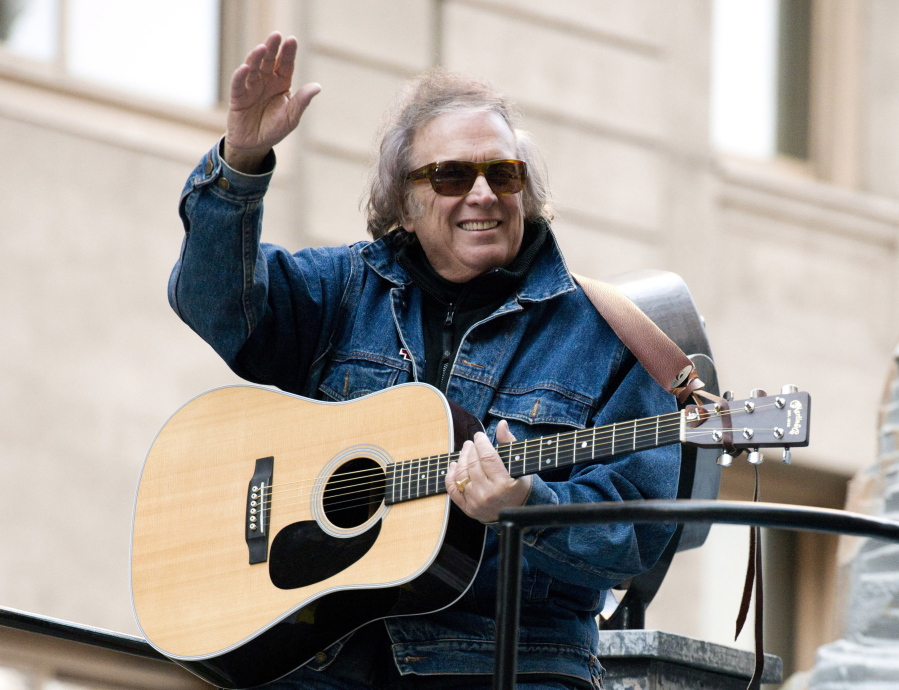NEW YORK — Don McLean has listened for decades as people belted out his classic song “American Pie” at last call or at karaoke — and applauds you for the effort.
“I’ve heard whole bars burst into this song when I’ve been across the room,” McLean tells The Associated Press from a tour bus heading to Des Moines, Iowa. “And they’re so happy singing it that I realized, ‘You don’t really have to worry about how well you sing this song anymore. Even sung badly, people are really happy with it.’ ”
Happy might be a bit of an understatement. “American Pie” is considered a masterpiece, voted among the top five Songs of the Century compiled by the Recording Industry Association of America and the National Endowment for the Arts.
McLean — and his singular tune about “the day the music died” — are now the subject of a full-length feature documentary, “The Day the Music Died: The Story of Don McLean’s ‘American Pie,’” streaming on Paramount+.
It’s mandatory viewing for McLean fans or anyone who has marveled at his sonic treasure. It also represents an elegant film blueprint for future deep dives into a song and its wider cultural relevance.
For those fans who have wondered about the lyrics they are singing loudly in bars and cars, McLean shares the secrets. “That was the fun of writing the song,” he tells the AP. “I was up at night, smiling and thinking about what I’m going to do with this.”
The documentary starts when a single-engine plane carrying Buddy Holly, Ritchie Valens and Jiles P. Richardson, the “Big Bopper,” plunged into a cornfield north of Clear Lake, Iowa, on Feb. 3, 1959, killing the three stars and their pilot.
McLean was 13, living in a suburban, middle class home in New Rochelle, N.Y., when the crash occurred. He had bronchial asthma, prompting the description of him in “American Pie” as “a lonely teenage broncin’ buck.” The “sacred store” he sings about was the House of Music on Main Street, where he bought records and his first guitar.
Young McLean was a paperboy — “every paper I’d deliver” — and adored Elvis, Gene Vincent, Bo Diddley but especially Holly, whose death deeply affected him. “I was in absolute shock. I may have actually cried,” he says in the film. “You can’t intellectualize it. It hurt me.”
Years later, McLean would plumb that pain in “American Pie,” baking in his own grief at his father’s passing and writing an eulogy for the American dream. He was creating his second album in 1971 while the nation was racked by assassinations, anti-war protests and civil right marches. He thought he “needed a big song about America.” The first verse and melody seemed to just tumble out. “A long, long, time ago …”
It climaxed in the huge sing-along-chorus: “We were singin’, ‘Bye-bye, Miss American pie’/Drove my Chevy to the levee, but the levee was dry/Them good old boys were drinkin’ whiskey ‘n rye/And singin’, “This’ll be the day that I die.”
“I said, ‘Wow, that is something. I don’t know what it is, but it’s exactly what I’ve been wanting to try to get ahold of — that feeling about Buddy Holly — for all these years and that plane crash,” McLean tells the AP. “I always feel a tug inside me whenever I think about Buddy.”
The 90-minute documentary incorporates news footage of the ’70s and uses actors in recreations. Cameras capture McLean visiting the hallowed Surf Ballroom in Clear Lake, the last place Holly and his fellow musicians played before their fatal flight in 1959.
There are interviews with musicians — Garth Brooks, “Weird Al” Yankovich and Brian Wilson, among them — as well as Valens’ sister, Connie, and actor Peter Gallagher, whose character’s death on “Zoey’s Extraordinary Playlist” promoted an onscreen performance of “American Pie.” The British singer Jade Bird, Cuban-born producer Rudy Perez and Spanish-language singer Jencarlos Canela speak to how the song has resonated far past America.
The documentary reveals that recording the album was not exactly a smooth process. Producer Ed Freeman was unimpressed with McLean’s clutch of songs and didn’t think McLean was up to playing rhythm guitar on “American Pie.” He eventually relented.
McLean — along with a few session musicians — rehearsed for two weeks without nailing the song, getting increasingly frustrated. The addition of pianist Paul Griffin at the last minute was a “Hail Mary” stroke of genius that made the whole tune click.
But recording the song was just the beginning of trouble ahead. At over 8 minutes, radio stations balked at playing it, and McLean’s record label, Media Arts, went bust just as it was to release the album “American Pie.”
After seeing the documentary, McLean was struck by a common strand in his career: “What I noticed was that I had to fight so many battles to get this thing done, to get everything. I’ve been fighting everybody my whole life,” he says. “I’m not difficult. I just want things the way I want them.”
“American Pie” is packed with cultural references, from Chevrolet to nursey rhymes, while namechecking The Byrds, John Lennon, Charles Manson and James Dean. The lyrics — dreamlike and impressionistic — have been pored over for decades, dissected for meaning.
The documentary answers some questions, but not all. McLean reveals that his oblique references to a king and a jester have nothing to do with Elvis or Bob Dylan, but he’s open to other interpretations. He explains that the “marching band” means the military-industrial complex and “sweet perfume” is tear gas.
The line in the chorus “This’ll be the day that I die” comes from the John Wayne film “The Searchers” and the farewell is a riff off “Bye Bye, My Roseanna,” a song his friend Pete Seeger sang. McLean was going to use “Miss American apple pie” but dropped the fruit.



